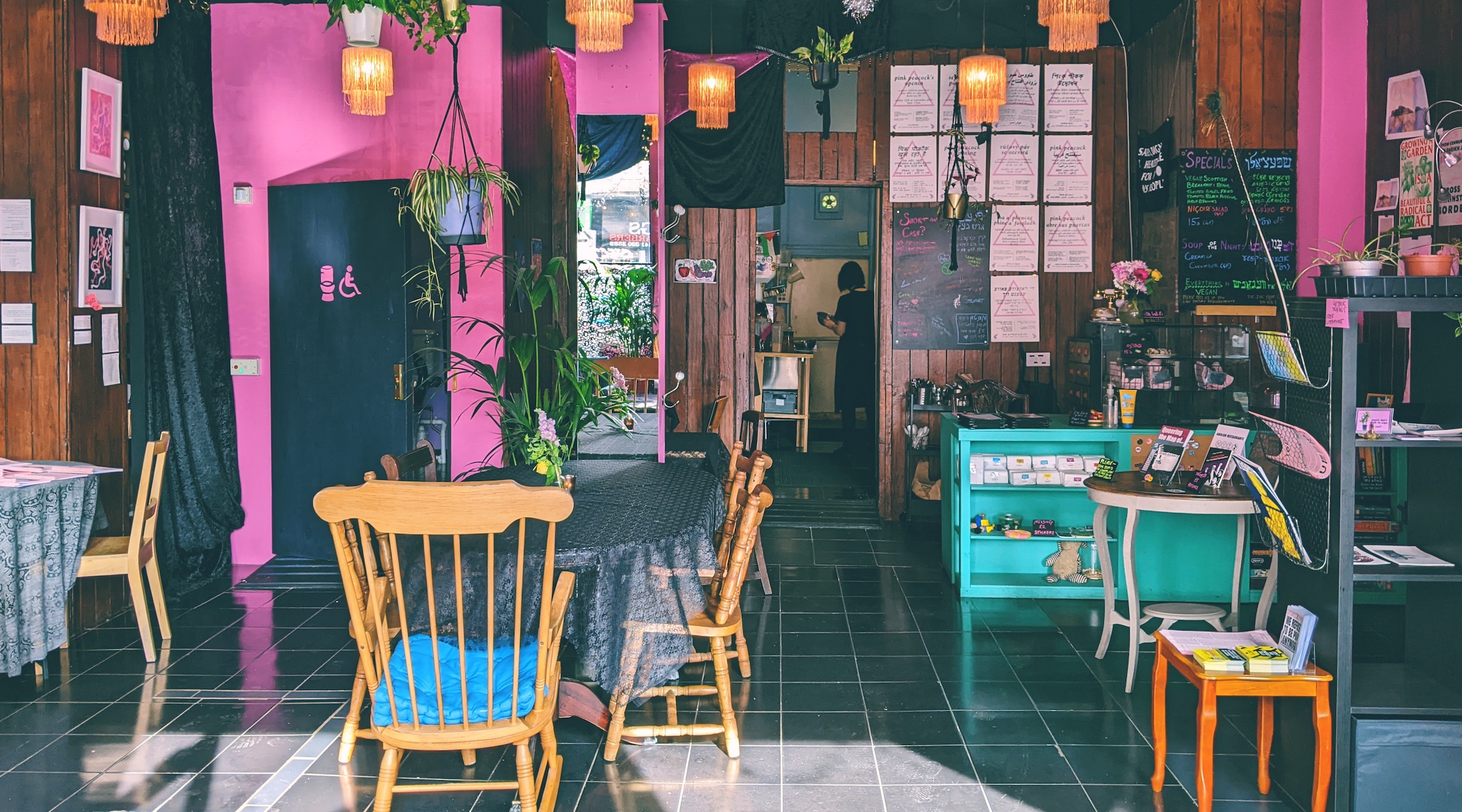The Pink Peacock, the anarchist, queer-friendly kosher Yiddish café that operated in Glasgow, Scotland for three years, is looking to reopen in Brooklyn this summer.
The cafe, which opened in 2020, generated serious buzz for likely being the only queer, Yiddish, anarchist and vegan pay-what-you-can café in the world. In 2023, it closed after its owners suffered from burnout, citing an “astonishing amount of antisemitic vitriol” during its three years of operation from other “self-described leftists.”
But now, according to Pink Peacock co-founders Moishe Holleb and Miles Grant, who are both American and independently wound up back stateside, the cafe hopes to find lasting success in New York City’s hippest borough.
“We saw that there was no anti-Zionist, queer, anarchist Jewish spaces in New York City, and where there’s a gap, we realized that this needs to continue to exist,” Grant said.
As for how they ended up looking in Crown Heights, Grant said it “just happened,” while they scoped out Jewish neighborhoods in New York. “There’s a good intersection between being the Jewish community, and also a lot of other communities who are in that same area,” he said. “And I think that’s really important to us, sort of saying, ‘we’re all connected, and there’s a lot of overlapping struggles,’ and I think that’s what spoke to us a lot.”
At least one local Jew is excited about the forthcoming venture. For Abby Stein, the ex-Hasidic transgender rabbi and activist, the prospect of a queer, Yiddish, anti-Zionist café not too far from her Park Slope home “seems really cool.”
“I mean, it’s queer Yiddish,” Stein said. “It’s some of my favorite stuff!”
“My favorite thing about New York Judaism is that it’s a buffet, and you can literally get anything and everything you’re looking for,” Stein added. “We don’t need another generic New York Jewish space.”
Crown Heights is home to large Caribbean, African-American and Jewish populations, though they tend to inhabit different pockets of the neighborhood.
“We see the same needs here: our communities are hungry for a Jewish anti-Zionist space which is accessible to Orthodox queer Jews, and unfortunately people are also literally hungry,” Holleb said. “We envision a community space that is centered around meeting these needs but open to everyone, with an ethos of solidarity and coalition building. We’re still in the very early stages, but hoping to open in the summer.”
The name of the café, which also goes by its Yiddish name, “Di Rozeve Pave,” is inspired by “di goldene pave,” or the golden peacock, a mythical symbol from Yiddish literature — though the color was changed to pink out of solidarity with the LGBTQ community. Yiddish — a language that has become increasingly popular among anti-Zionist Jews as an alternative to Hebrew — is sprinkled across the cafe’s menu, which refers to “tunah” for tuna, and “shmir” for shmear.
Like the Glaswegian original, Brooklyn’s Pink Peacock will also be an anti-Zionist prayer and community space that will host activities such as art exhibitions, interfaith events, Yiddish choir practice and holiday celebrations like a Shavuot anarchist book fair and a drag Purim spiel.
During their three-year run in Scotland’s most populous city, the Pink Peacock was no stranger to controversy, having once sold universal handcuff keys ahead of a major climate conference protest. The café, which shuttered for good a few months prior to Oct. 7, had a Palestinian flag on display, as well as a poster with the slogan “Jews and Queers for a Free Palestine.”
For several months in 2020-2021, a tote bag was displayed in the window with the words “f— the police,” which led to Holleb being charged with committing a breach of the peace — a criminal offense in Scotland. At one point, the cafe also displayed a flyer for a Yom Kippur Ball “in the Jewish anarchist tradition,” to be held on the somber holiday.
In New York City, anti-Zionism is “a missing voice,” Grant said. “Jewish New Yorkers definitely have a much wider stream of opinion than is represented in a lot of Jewish institutions in New York. So we think it’s important that we’re clear in our values and that we also provide a home for people who share those values.”
“It makes sense that this unique Jewish voice should exist in a place where there’s other Jewish voices as well,” said Grant, who is also a climate activist. “We’re not, just, in the middle of nowhere in Scotland. We’re actually sort of among other Jewish communities here.”
Glasgow’s Jewish community is quite small, numbering around 9,000. New York City’s Jewish community, by contrast, numbers nearly 1 million, and the borough of Brooklyn is home to the most Jews in the area at 462,000.
Many of Brooklyn’s Jews are Orthodox or Hasidic — particularly in Crown Heights, which is home to the global headquarters of the Chabad-Lubavitch Hasidic movement. Rabbi Menachem Mendel Schneerson, the last Lubavitcher rebbe, believed any Israeli concession of land to the Palestinians would endanger the Jewish people, and the vast majority of Chabad adherents are pro-Israel.
However, the Pink Peacock doesn’t have a lease signed yet, and it’s possible the café won’t be located within the Chabad-oriented part of the neighborhood.
“In my mind, there’s a lot of people, even from my community, who live in not the Chabad part,” Stein said, referring to local indie Jewish groups like Minyan Atara, which is an independent egalitarian prayer community, and Brooklyn Shabbat Kodesh, an anti-Zionist minyan, as well as individuals associated with Jews for Racial and Economic Justice, which has its headquarters in the borough. “I think [the Pink Peacock] fits in perfectly in that way.”
The New York Jewish Week brings you the stories behind the headlines, keeping you connected to Jewish life in New York. Help sustain the reporting you trust by donating today.





